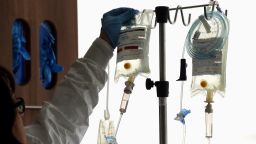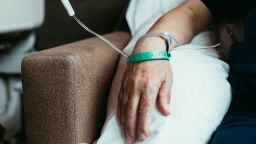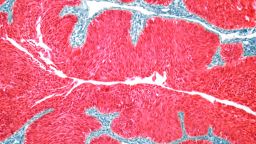The United States is in the midst of some of the worst cancer drug shortages in history, affecting thousands of patients across the country who face delayed or cancelled chemotherapy appointments. But these shortages aren’t just bad for current patients, experts say; their effects on cancer research may be felt for years to come.
The National Cancer Institute, the federal government’s main agency for cancer research and training, told CNN that at least 174 of its 608 trials may be affected by the shortages. However, that number can’t account for other trials that rely on these drugs or possible trials that researchers would like to start but can’t.
For a mix of complex reasons, many cancer drugs have gone into and out of shortage for years, experts say, but at least 25 are now in shortage, according to the American Society of Health-System Pharmacists. Two in particular — carboplatin and cisplatin — may be hurting research the most because they are used with such a wide variety of cancers. Cisplatin and other platinum-based drugs are prescribed for 10% to 20% of all cancer patients, according to the National Cancer Institute.
In 2016, when Vice President Joe Biden launched the Cancer Moonshot to “accelerate the rate of progress against cancer,” cutting-edge research was supposed to become a national priority, but with a record number of cancer drugs in shortage, it’s become extremely difficult to conduct even basic research.
Crucial work on hold
“With drug shortages, trials have become almost like an impossible task. You start asking yourself, ‘why am I doing this? Should I get a new job?’ ” asked Dr. Shadia Jalal.
At the Indiana University Melvin and Bren Simon Comprehensive Cancer Center, Jalal has overseen several clinical trials that have improved patients’ chances of beating their cancer. She’s also an associate professor of medicine in the Division of Hematology/Oncology at IU School of Medicine; she directs research priorities for Hoosier Cancer Research Network, an independent nonprofit that specializes in early-phase multicenter investigator-initiated oncology clinical trials; and she cares for some of the country’s most vulnerable with the Veterans Administration.
The shortages affect every aspect of her work, and she says they’ve really gotten to her.
“Honestly, last week, I was so feeling down about it all,” Jalal said. “I was trying to remind myself of why I’m here.”
Her trials have been able to continue, at least for now, but some researchers haven’t been as fortunate.
“We’ve heard of institutions shutting down many new clinical trials that involve these drugs in shortage,” said Dr. Mark Fleury, policy principal with the American Cancer Society Cancer Action Network, a nonprofit, nonpartisan advocacy affiliate of the American Cancer Society. Fleury said the issue has not gotten as much attention as the shortages’ effects on individual patients, but it has put the country’s push for better cancer medicine in real jeopardy.
“Obviously, if you’re not doing the research for the next best drug, that’s causing ramifications that we may not fully feel for a few years to come,” Fleury said.
Dmitry Walker, assistant director of pharmacy oncology and investigational drug services at WVU Medicine, said his institution would love to offer a trial for people with bladder cancer using Bacillus Calmette-Guérin (BCG), a treatment that has showed real promise, but a yearslong limited supply makes it impossible.
BCG is not on the US Food and Drug Administration’s drug shortage list, but the American Society of Health-System Pharmacists lists it as in shortage because drugmaker Merck has instituted tight controls while demand exceeds supply.
“We’ve actually not been able to open a clinical trial like that, because you have to guarantee you’ll have enough cycles of treatments for them. And we don’t get enough allocation from the manufacturer even to meet our regular patient demand,” Walker said. “I know it’s been very frustrating for our urology physicians, because there’s definitely patients that would benefit from this clinical trial.”
The National Cancer Institute says that none of its clinical trials have had to close or have been put on hold because of the shortages but that some sites may not be able to enroll patients, and not all sites will be affected at the same time.
“We are in close communication with clinical trials sites to monitor the situation and will provide updates as new data are available,” the institute told CNN in an email.
‘No real rhyme or reason’
Novel drugs typically aren’t the problem for researchers, because pharmaceutical companies can usually supply those to investigators. The problem lies with the drugs that scientists often use in comparison or conjunction with the novel treatment. They’re the medicines that doctors currently use to treat patients, and they’re often generics.
A survey of major cancer centers published last month found that 93% couldn’t find enough carboplatin, and 70% had cisplatin shortages, according to the National Comprehensive Cancer Network. At the beginning of June, the Biden administration worked with China on a special allowance to import cisplatin to help ease the shortage, but the drug remains on the FDA’s shortage list.
Dr. Lawrence Feldman, a hematology and oncology specialist who has managed cancer drug trials at the University of Illinois Medical Center in Chicago, is recruiting patients for part of a multicenter lung cancer trial that Jalal’s center is also involved in.
The trial uses carboplatin, which the center ran out of at one point. Swapping in cisplatin, which was more available, would require him to amend the trial.
“That takes a fair amount of paperwork, and it has to be approved,” Feldman said. It’s time that researchers would rather dedicate to patients, but still, he went ahead with the switch. Just as he was trying to make the change, his center finally got a carboplatin shipment, but he filed the paperwork anyway, in case they have problems again.
“You never know,” Feldman said. “These drug shortages come and go, and there’s no real rhyme or reason, and there seems to be no rhyme or reason in terms of which institutions have shortages. So it did affect us.”
The FDA told CNN in an email Thursday that it is “working closely with a number of manufacturers, agencies, and others in the supply chain to understand, mitigate and prevent or reduce the impact of intermittent or increased demand of certain products.” The agency said it is also working across the government to find potential policies that may “ensure meaningful solutions.”
In one sense, Feldman was lucky because he could swap out drugs. But with cancer, there are often no alternatives.
Get CNN Health's weekly newsletter
Sign up here to get The Results Are In with Dr. Sanjay Gupta every Tuesday from the CNN Health team.
Tenuous supplies have made it difficult to plan trials, a process that takes years. What drugs are plentiful now may be in shortage by the time the trial opens. Jalal worries about a trial conducted by a researcher whom she’s mentoring; Jalal was thrilled when it recently opened, but the trial requires a steady supply of carboplatin.
“I hope to God we can enroll the study on time. We’ve been planning this for two years. I kept thinking to myself, ‘I hope it’s enrolled,’” she said.
A delay in a trial isn’t just inconvenient. It can mean that the research becomes irrelevant.
“The field changes so quickly,” Jalal said. “With a delay, you find yourself asking ‘am I really going to be able to impact things by the time my study finishes?’ “
Experts say cancer drug shortages probably won’t get better any time soon, and that’s be a big concern for the US, since it means denying help to people who could benefit from participating in these trials.
“It’s honestly very, very stressful, and just taking care of people with cancer is already really stressful,” Jalal said. “I can’t imagine being a cancer patient right now. It’s very terrifying.”




